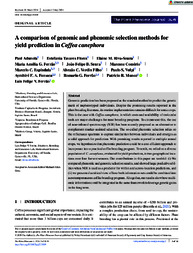A comparison of genomic and phenomic selection methods foryield prediction in Coffea canephora.
A comparison of genomic and phenomic selection methods foryield prediction in Coffea canephora.
Author(s): ADUNOLA, P.; FLORES, E. T.; RIVA-SOUZA, E. M.; FERRAO, M. A. G.; SENRA, J. F. B.; COMÉRIO, M.; ESPINDULA, M. C.; VERDIN FILHO, A. C.; VOLPI, P. S.; FONSECA, A. F. A. da; FERRÃO, R. G.; MUNOZ, P. R.; FERRÃO, L. F. V.
Summary: Genomic prediction has been proposed as the standard method to predict the genetic merit of unphenotyped individuals. Despite the promising results reported in the plant breeding literature, its routine implementation remains difficult for some crops. This is the case with Coffea canephora, in which costs and availability of molecular tools are major challenges for most breeding programs. To circumvent this, the use of near-infrared spectroscopy (NIR) has been recently proposed as an alternative to complement marker-assisted selection. The so-called phenomic selection relies on the reflectance spectrum to capture similarities between individuals and emerges as a valid approach for prediction. With promising results reported in multiple annual crops, we hypothesize that phenomic prediction could be a cost-efficient approach to incorporate into a practical coffee breeding program. To test it, we relied on a diverse population of C. canephora, evaluated for yield production, in two geographical locations over four harvest seasons. Our contributions in this paper are twofold: (i) We compared phenomic and genomic selection results, and showed large predictive abilities when NIR is used as a predictor for within and across-location predictions, and (ii) we presented a critical view of how both information sets could be combined into a contemporaneous coffee breeding program. Altogether, our results show how multi-omic information could be integrated in the same framework to leverage genetic gains in the long term.
Publication year: 2024
Types of publication: Journal article
Unit: Embrapa Coffee
Keywords: Coffea Canephora, Genomics, Phenomics, Yields
Observation
Some of Embrapa's publications are published as ePub files. To read them, use or download one of the following free software options to your computer or mobile device. Android: Google Play Books; IOS: iBooks; Windows and Linux: Calibre.
Access other publications
Access the Agricultural Research Database (BDPA) to consult Embrapa's full library collection and records.
Visit Embrapa Bookstore to purchase books and other publications sold by Embrapa.

